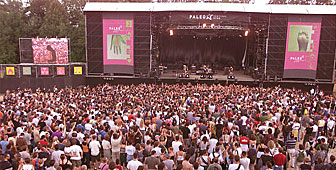Swiss music festivals tackle noise levels

Since 1996, Swiss music festivals have coped with new laws regulating noise levels. However, some festivals find it increasingly hard to respect those laws.
Under rules established by the Federal Health Office in 1996, discos, bars and restaurants are allowed to play music at a maximum hourly volume of 93 decibels. Special authorisations are given for musical events, such as open-air festivals, where music can be played at a maximum hourly volume of 100db per hour, with tolerated peaks at 125.
The health office says spectators must be informed of potentially hazardous noise levels, and should receive free earplugs. Exposure to loud music can destroy the inner ear, and impair hearing permanently.
However, organisers of the festivals are not satisfied with the new rules.
“One hundred decibels is simply not enough,” said André Crousaz, who is on the organising committee of the Paléo Festival in Nyon. He says organisers attempt to satisfy the demands of spectators, while following regulations of the Swiss Federal Health Office in Bern.
“People like to have the sound loud and vibrations, but on the other hand, the Federal Health Office says we have to warn young people about the dangers of loud music.”
Power struggles
For the past ten years, Paleo has used a sound system which places amplifiers high above the ground, to protect listeners who want to be up close to the stage. However, the difficulty is not always technical.
Sound engineers accompanying foreign bands sometimes crank up the volume. Organisers say they are powerless because the bands threaten to leave if their terms are not accepted. The same organisers say they are always afraid they might lose contracts because of Switzerland’s tight restrictions.
“When some bands see the contract and its restrictions concerning sound levels, we immediately start receiving faxes and phone calls from people telling us they refuse to play under those conditions,” Crousaz says. “If the bands have a chance to play in another country with more lenient restrictions, they might decide not to stay.”
International cooperation
Crousaz says all European countries must get involved in noise prevention if problems are to be resolved. Similarly, Chuard stresses a need for Europe-wide legislation.
“It’s a problem we won’t be able to solve in Switzerland, because foreign artists don’t really care about what we tell them,” Chuard says. “That’s why European legislation would be far more useful.”
According to the Federal Health Office, things are starting to move at an international level.
“Austria has decided to set up a commission aimed at bringing various European Union legislations in line with each other,” said Vlasta Mercier, scientific counsellor at the FHO. “But for now, some of the safest countries to listen to a concert are Switzerland, Austria, Sweden and Denmark.”
“Although Italy has a maximum 95db limit, that rule is rarely enforced,” Mercier said. “Great Britain is not a safe place either for sensitive ears, because there isn’t any legislation there regulating noise levels.”
Differing earplug quality
Although spectators receive free ear protection at festivals, the protection can vary. At Paléo, two insurance groups distributed two different kinds of earplugs – a well-made, expensive type, and a cheap one. At Rock Oz Arenes, the quality of earplugs distributed by an insurer sponsoring the event fell into “the free category”, Chuard said.
The free earplugs effectively protect users from hazardous noise levels, but some cut off more frequencies than others. As a result, the sound quality for spectators wearing earplugs can vary strongly, and can affect their enjoyment of the music.
by Jeff Nottage

In compliance with the JTI standards
More: SWI swissinfo.ch certified by the Journalism Trust Initiative








You can find an overview of ongoing debates with our journalists here . Please join us!
If you want to start a conversation about a topic raised in this article or want to report factual errors, email us at english@swissinfo.ch.